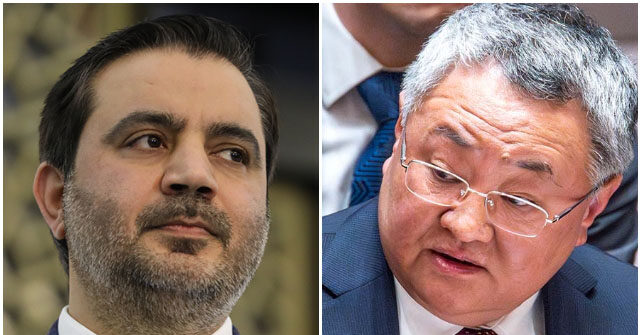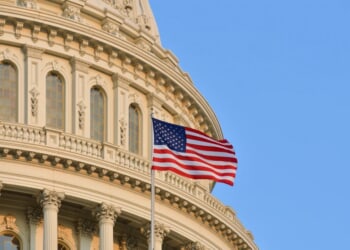Syrian Foreign Minister Asaad al-Shaibani said on Monday that the junta in Damascus wants to “strengthen relations with China” and develop a “strategic partnership.”
To that end, Shaibani met with Chinese Ambassador to the United Nations Fu Cong at U.N. headquarters in New York on Monday. The Syrian foreign minister said the two nations agreed to “work together” on their partnership, although no details of their plans were made public.
“Syria appreciates China’s stance in support of Syria’s rights and in resolving the Syrian crisis through political dialogue and international cooperation,” Shaibani said after the meeting.
WATCH — Exclusive Rubio Interview: Peace in Ukraine, Standing Up to China, Trump Electrifies World:
China, like its fellow authoritarian regimes in Russia and Iran, was a military and economic support of dictator Bashar Assad during the brutal decade-long civil war he fought to remain in power.
Russia and Iran sent in troops to keep Assad in power, while China ran cover for him at the United Nations, using its U.N. Security Council veto to block eight resolutions pertaining to the Syrian civil war. China has used its veto power a grand total of 19 times since 1955, and eight of those vetoes were employed on Assad’s behalf.
With Russia and Iran distracted by their wars in Ukraine and Gaza, a coalition of Islamist insurgents headed by an al-Qaeda offshoot called Hayat Tahrir al-Sham (HTS) managed to topple Assad with a swift march on Damascus in December 2024.
HTS established what is supposed to be an “interim” government, presided over by its leader, former al-Qaeda and Islamic State member Ahmed al-Sharaa. Shaibani has served as the new government’s foreign minister since the day after Assad was overthrown. Before that, he was director of political affairs for the “Salvation Government,” the shadow government established by rebel groups in Syria’s Idlib province in 2017.
The Salvation Government was the first major effort by HTS to establish itself as a legitimate political party with significant administrative skills, rather than just an al-Qaeda splinter group and a jihadi insurgent militia. Reviews of the Salvation Government’s success were decidedly mixed, but HTS now finds itself controlling (almost) all of Syria, and one of its highest priorities is gaining international recognition so the sanctions leveled against the Assad regime might be lifted.
“The people of China and Syria enjoy a traditional friendship,” Chinese Foreign Ministry spokesman Guo Jiakun said on Tuesday when asked about Shaibani’s meeting with Ambassador Fu in New York.
“China supports Syria in realizing peace at an early date and finding a nation-reconstruction plan that meets its people’s aspirations through inclusive dialogue,” Guo said.
“We hope that Syria would firmly oppose all forms of terrorist and extremist forces,” he added.
China’s interest in Assad may have been born from Beijing’s general sense of unease during the Arab Spring revolutions of the early 2010s. The Chinese were worried about Arab Spring unrest spreading to their own Muslim minorities, especially the Uyghur Muslims, some who journeyed to Syria to join the rebellion against Assad. China was not comfortable with the notion that some of those militants might return home with battlefield experience and weapons.
The Assad regime joined China’s Belt and Road Initiative (BRI) in 2022. Assad, believing he had decisively won the Syrian civil war, was eager for Chinese assistance with postwar reconstruction, while China wanted a prime cut of the lucrative Syrian reconstruction business. During his remaining two years in power, Assad often pointed to his membership in BRI as China’s seal of approval for the legitimacy of his government. He also anticipated using BRI to evade Western sanctions and China was eager to help him, envisioning Syria as the first great triumph for a new world order in which China eliminated sanctions as an effective tool for imposing Western humanitarian ideals.
The pragmatic Chinese are unlikely to see a reason not to shrug off the defeat of Assad and rebuild a profitable relationship with the rebels who ousted him, while HTS clearly wants money and international support, and it will have a much easier time forgiving China’s economic support for Assad than Russia’s military assistance to the late regime.
The Hindu recently pointed out one bit of unfinished business that might complicate the new relationship between Beijing and Damascus — some of those Uyghurs who joined the rebellion against Assad are still in Syria and they hold important positions in the new Syrian army. There could be up to 2,000 Uyghur officers in the Syrian army, and at least one of them is a high-ranking commander.
The contrast with China’s relationship with the Taliban in Afghanistan is instructive. The Taliban was willing to pull Uyghur militants back from Afghanistan’s small Chinese border region to satisfy Beijing’s security concerns, but The Hindu was skeptical that Sharaa will be quite so willing to turn against his longtime Uyghur allies.

















